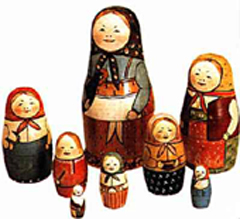Speaking Russian is considered cursing in Germany
Angela Merkel says that immigrants must assimilate and learn to speak German
18 September is the day of the coming elections to Bundestag in Germany. The main rival of the present German chancellor Gerhard Schroeder will be Christian  Democratic Union leader Angela Merkel. Most of the Germans hope that she will lead the country out of prolonged economic crisis.
Democratic Union leader Angela Merkel. Most of the Germans hope that she will lead the country out of prolonged economic crisis.
Russian politicians are mostly worried about the kind of relations that will develop between president Vladimir Putin and the new lady-chancellor. However, for a certain group of people the victory of Angela Merkel can worsen the living conditions. These are so-called Russian Germans, who emigrated from Russia several years ago.
To this day five million (some sources name seven million) Russians are living in Germany. They cannot be called Russians in the proper sense of the word, as most of them are ethnic Germans, descendants of those who immigrated to Russia in the time of Peter the Great and kept up their traditions for centuries until deported to Kazakhstan by Stalin. After the USSR had collapsed Germany called its lost citizens back home.
An elderly lady Galina who used to be the head of a school in Karaganda and is now working as a cleaning lady in Germany says, “There was nothing to eat in Karaganda, where my family and I had been living. That is why we considered an invitation to Germany a blessing. We've been here for nine years already. Oh yes, they gave us some money for rising up so to say. Our relatives that are still living in Kazakhstan think that we are living in paradise. It isn't so, though. Germans are concealing their dislike for foreigners behind their polite smiles. I am not accepted for the teacher's position although my German is rather good and I've proved my professional skills. But when they see the place of my birth in the passport they say politely they are not able to hire me at the moment. I had to face it about twenty times. Then I gave up and am currently working as a cleaning lady. All of my acquaintances gave gone through similar situations”.
A student of the Faculty of Law of the University of Leipzig, Ekaterina Nazarova, who used to live in St. Petersburg shares her opinion, “It is really impossible to find a job in Germany, which would coincide with your profession. It is not the negative attitude of Germans towards Russians. The thing is that the level of unemployment here is so high that the even those who were born in Germany can hardly find a job. That is why my parents who have degree in medicine are glad to be working as nurses”.
Professor Joachim Rogosch says, “There is a dual situation in Germany at the moment. On the one hand, rank and file Germans do not like foreigners, who are taking away all the jobs. On the other hand, Germans will not accept jobs and wages that are offered to the foreigners at the labor exchange. Italians used to be the unskilled workers here; they are now replaced by Russians and Turks. The thing is that we lost our ability to do certain things! Once the labor exchange organized courses for the unemployed where they were taught to clean the windows, to weed the garden beds and to work at the laundry. It was even shown on television. Germany is badly in need of labor force. But in spite of this need, many of the employers do not want to deal with immigrants. Another thing is that nobody will ever confess it. We, the Germans, are afraid of being called nationalists in the first place!”
In one of the pre-election speeches in Bavarian city of Augsburg (where out of 250 thousand citizens 30 thousand are Russians) Angela Merkel said, “Germany welcomes people from our countries as always, but those who would like to live here must assimilate and learn German! There is no way to be German by passport and not to know language and culture of your own country!”
It is really a big problem. By no means all of the German citizens speak German. Almost in every city there are two quarters – Turkish with its snack bars, small shops and mosque and Russian with its discos, schools and kindergartens. German is a rarity in these quarters. Russians, who have been living in Germany for a long time, are said to mix the two languages. They use Russian as their main language with a few German words for their convenience. Pensioners who moved to Germany to live their last years on pension could not master German. Many young people who immigrated while they were teenagers still consider German a foreign language. They hardly finished schools where they studied together with the similar Russian Germans and now they go on communicating mostly with their compatriots.
“I don't like these German mugs”, 20-year-old Sergey confesses. “Although they are always smiling they are insincere and hate us! They consider us people of the second chop and they want us to do all the dirty work for them!”
The latest innovation in the German police is that all the policemen should know the necessary minimum of Russian apart from speaking English. Former Russian citizens bring their own rules to Germany. Fights with Turks are common. One of such fights ended up in a Turk shouting in the German court, “There is no place for foreigners in Germany!” This exclamation almost led to another fight right in the courtroom.
There are different communities within the Russian community: for example, Kazakhs or Siberians. Those who come from St. Petersburg or Moscow stand apart.
Elena, who came from St. Petersburg seven years ago, says, ”I am very ashamed of my compatriots. When you get on the bus, you can always here Russians cursing. The seats are covered with writings of Russian curse words. Youngsters are drinking beer and quarrelling. One of our acquaintances served five years in a German prison. He said that they were only three real Germans among the prisoners. All the rest were either Russians or Turks. Eight out of ten names in criminal reports are always Russian. Those who come from Kazakhstan are country people who do not want to change their habits. If you visit them you'll see they still have the same things as they used to have in their village: same carpets, same clothes, same vodka. It is true that Germans are not fond of Russians, but it is easy to understand why!”
Lyubov Rumyantseva
Subscribe to Pravda.Ru Telegram channel, Facebook, RSS!




